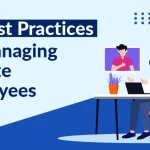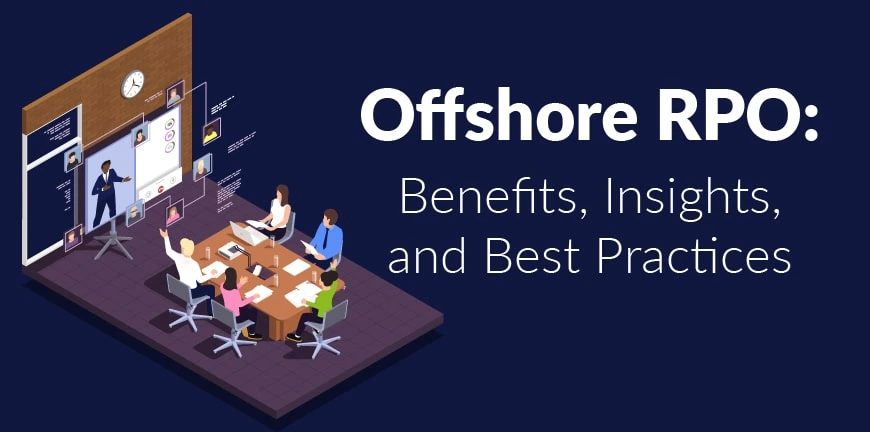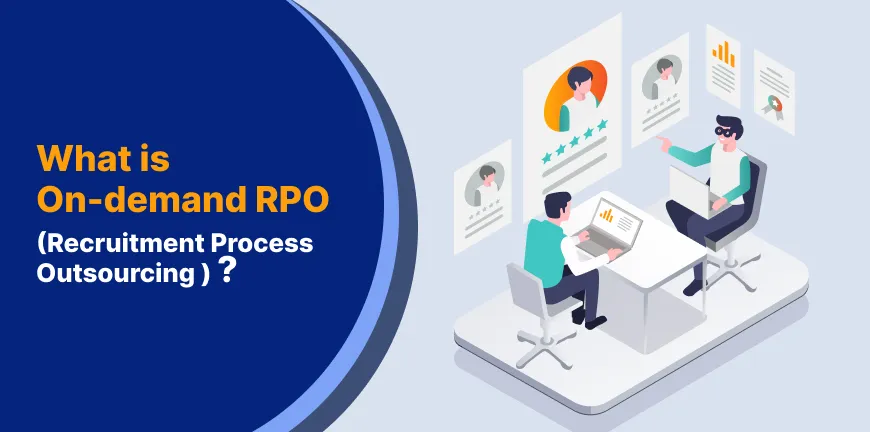
5 Workplace New Year Resolutions Every Employer Must Make
27/12/2024
15 Best Practices for Managing Remote Employees
30/12/2024People are the drivers of growth for any business. As a business, you must look at how best you can hire within your capabilities. And if you choose not to outsource, then you must hire a person from within your geography, to work from an office or go remote. Though sometimes this may be preferable, offshore recruitment process outsourcing (RPO) has its own benefits.
You get talent you wouldn’t get otherwise, it is cost effective, and many times this talent is exceptional. In this article, we look at what we mean by Offshore RPO, the benefits we can derive from it and the best practices we must follow.
What Is Offshore RPO?
Let us now define what we mean by Offshore RPO. Offshore RPO is a strategy where a company outsources all its recruitment functions to a service provider who will recruit candidates overseas. Offshore RPO specifically requires a mindset from the future employees of accepting remote work culture and flexibility at work.
With the growth of technology, now it is a lot easier Offshore RPO companies to function and adhere to the best practices that are so crucial for their success and not only bring great candidates onboard but ensure that these remote workers have a great experience working with the business they are selected for. This has led to Offshore RPO becoming very popular over the years worldwide.
What Are the Benefits of Offshore RPO?
When you bring in candidates from international locations, they will possess unique cultural and technical know-how which could be very useful for your business and help in its diversity. Let’s now look at the key benefits of Offshore RPO, the things that make it stand out amongst other recruitment practices and be in a league of its own.
1. Cost-savings
Offshore Recruitment Process Outsourcing can help you hire remote workers who need to be paid a lot less than some of your great office talent and be more skilled than them. This has caused several employers to look at Offshore RPO as a more feasible strategy than Onshore RPO, especially if they have already decided to outsource their recruitment process.
2. Access to a Wider Talent Pool
A wider talent pool on tap means that you have access to a larger number of candidates. When you do this, you have the assurance that if you do hire the wrong candidate the first time, you can always go back to one of the candidates you shortlisted earlier and still ensure a reasonably great fit.
3. High Quality Hires
With Offshore RPO, you get higher quality hires, thanks to the global reach that most Offshore RPO companies have. There’s always a special talent somewhere in the world who would be a great fit for you without having to compromise on your budget. This is one of the most important benefits of an Offshore RPO.
4. Scalability When Required
Over time, a company’s financial position is bound to change. Some companies get an economic lift and look forward to expanding into other sectors and economies. This means they will look for new talent, preferably in those geographies. Offshore RPO services become a viable option.
5. Improve Business Availability
With remote workers, your business gets much needed flexibility. You can accommodate the requests of clients even when your office is not functioning, because of the remote workers in other geographies.
6. Best Practices Followed
Offshore RPO service providers ensure that the best practices are followed. By following these best practices, Offshore RPO companies help their clients get the best candidates and ensure they have great recruitment experience. Offshore RPO companies also remain compliant with the laws of the country, another critical benefit of Offshore RPO.
What Are the Best Practices for Implementing Offshore RPO?
Following the best practices in offshore RPO ensures the best use of strategic business opportunities to secure great offshore talent for any business. Let us now look at these best practices in more detail now.
1. Adjusting for the Time Difference
This is one of the biggest challenges and here is where an Offshore RPO must be very prudent. Identifying the times when onshore and offshore timings overlap to fix a time for a critical meeting can be difficult, especially if there are multiple candidates in the pipeline. Use scheduling tools for scheduling such interviews ahead of time.
2. Effective Communication
Effective communication is the foundation of building great Offshore RPO. With great communication tools, you can ensure that the recruitment process is on track and that the communication leads to a quality hire before time. Use a combination of messaging and video conferencing tools to make this happen.
3. Performance Tracking and Metrics
An application that does attendance and performance tracking of employees, including their efficiency and the utilization of their resources, will be very useful. Regular performance reviews from the manager are also useful when you must manage several offshore employees.
4. Addressing Cultural Differences
Cultural differences are more easily addressed when you directly address them in meetings with the prospective talent. This will ensure that the candidate once onboarded in the company becomes a great cultural fit in the organization.
5. Establishing Clear Expectations
This is another critical best practice in Offshore Recruitment Process Outsourcing. When you establish clear expectations, you ensure that the recruit will not only be a great cultural fit but also have the right attitude to comply with the company’s internal policies.
6. Regular Knowledge Sharing
You must share knowledge with the candidate throughout the recruitment process, whether it is through published documents or through word of mouth, so that the candidate has little doubt about what he/she must fulfil.
How Offshore RPO Works?
1. Initial Consultation
We provide an initial consultation where we discuss the staffing needs with the client. We identify skill gaps in the company and give the client greater clarity on how they must approach staffing.
2. Job Role Planning
We understand based on the skill gaps what job roles would be most relevant and how they must be structured. We create candidate personas that help us shortlist the best talent.
3. Resource Planning
We begin our resource planning phase where we try and understand what resources would be required for the jobs and the roles that we created in the second step. We also decide who the stakeholders would be.
4. Sourcing
In this step, we create job descriptions based on the previous two steps and then post them on multiple channels both online and offline, maintaining contact with those who apply for the jobs we have created.
5. Screening and Interviewing
We look at the profiles we have received and conduct ATS and assessment-based screening to narrow a thousand down to 10 or so profiles. From these, we suggest profiles suitable for interviewing and forward them to the client.
6. Offer Extension and Discussion
We extend an offer to the candidate, after acceptance of which we move to the onboarding stage. If the candidate is unhappy with the offer, then renegotiation and further discussion is possible.
7. Onboarding
Our onboarding services involve presenting the right contracts, providing access to the right documentation, explaining how the candidate can get support if necessary, and providing guidelines for the workplace.
8. Background Checks
The candidate’s background will be verified through appropriate references and the same will be updated under their profile for future reference.
9. Ongoing Support
We will provide ongoing support to the candidate and the client throughout the hiring process and for issues pertaining to payroll and compliance, if need be, in the future.
Are You Looking for Recruitment Process Outsourcing (RPO)?
Despite how well we described the working and best practices for Offshore RPO, you may not be confident you can manage your recruitment process by yourself. You may even be confused who to pick among the many RPO service providers. Alp Consulting, with its experience of over two decades in recruitment and staffing, can help you manage parts or the entirety of offshore RPO, ensuring that you get the most value. We have already helped several Fortune 500 clients. Will you be next?
Frequently Asked Questions
1. What is Offshore RPO and how does it work?
Offshore RPO is a business strategy of outsourcing your recruitment process to a third party who will then recruit offshore candidates for you. An Offshore RPO company takes care of RPO and follows the steps described in the previous section.
2. What industries benefit the most from Offshore RPO?
Industries such as IT, FinTech, Healthcare and It enabled services benefit the most from Offshore RPO. Sectors like automobile manufacturing, specifically the manufacturing of EVs, could also benefit from the acquisition of specialists abroad.
3. What challenges can arise with Offshore RPO?
The common challenges associated with an Offshore RPO are time zone differences, incorrect expectations being set through miscommunication, and the lack of regular communication between the recruitment team and the candidate.
4. How does Offshore RPO help businesses save costs?
To a business in its initial stages, every opportunity represents a chance for growth. An Offshore RPO can help businesses across stages of advancement save a lot of costs. An Offshore RPO can recruit people from low-cost locations and prevent the risk of wrong hires and reduce the number of rehires. All of this saves on costs.
5. What makes Offshore RPO different from traditional in-house recruitment?
Traditional in-house recruitment is different from Offshore RPO in many ways. Traditional recruitment generally focuses on full-time positions for work from the office, whereas Offshore RPO onboards remote employees and trains them suitably before onboarding. The reach of an Offshore RPO is global too, as opposed to that of a traditional RPO.
Contact Us For Business Enquiry

Amit Saproo
Amit Saproo is the Head of Operations at ALP Consulting with nearly 17 years of experience in Executive Search, RPO, Leadership, and IT & Engineering recruitment. He leads nationwide recruitment programs across Technology, BFSI, and R&D domains, driving strategic hiring solutions for diverse client needs. Amit excels in building and managing high-performance teams that deliver scalable, end-to-end recruitment and consulting services.




